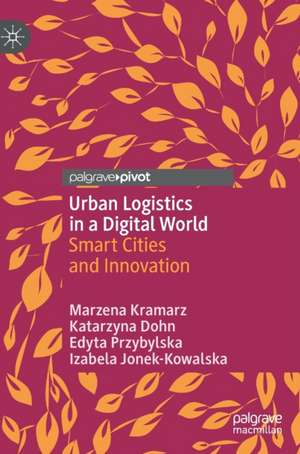Urban Logistics in a Digital World: Smart Cities and Innovation
Autor Marzena Kramarz, Katarzyna Dohn, Edyta Przybylska, Izabela Jonek-Kowalskaen Limba Engleză Hardback – 18 noi 2022
This book explores logistics within smart cities: the greater logistical demands of a smart city, how logistics can be adapted to new challenges, and what sort of new logistical support a smart city will need. The book pays particular attention to how logistical innovation within a smart city can lead to greater sustainability in the city, and on a global level. It will be of interest to academics working in logistics, urban planning, innovation management, digital technology, sustainability management, and operations management.
Preț: 353.40 lei
Nou
Puncte Express: 530
Preț estimativ în valută:
67.63€ • 73.44$ • 56.81£
67.63€ • 73.44$ • 56.81£
Carte tipărită la comandă
Livrare economică 23 aprilie-07 mai
Preluare comenzi: 021 569.72.76
Specificații
ISBN-13: 9783031128905
ISBN-10: 3031128907
Pagini: 173
Ilustrații: XVI, 173 p. 47 illus.
Dimensiuni: 148 x 210 mm
Greutate: 0.38 kg
Ediția:1st ed. 2022
Editura: Springer International Publishing
Colecția Palgrave Macmillan
Locul publicării:Cham, Switzerland
ISBN-10: 3031128907
Pagini: 173
Ilustrații: XVI, 173 p. 47 illus.
Dimensiuni: 148 x 210 mm
Greutate: 0.38 kg
Ediția:1st ed. 2022
Editura: Springer International Publishing
Colecția Palgrave Macmillan
Locul publicării:Cham, Switzerland
Cuprins
Chapter 1. Smart City - a holistic approach.- Chapter 2. Logistic support areas of cities in the context of material flows.- Chapter 3.The concept of logistics maturity of cities.- Chapter 4. Logistics maturity of Polish cities on the way to becoming a smart city.- Chapter 5. Model of cooperation between logistics service providers and cities (economic support in assessing this model).
Notă biografică
Marzena Kramarz is a researcher dealing with the issues of strategic management, based at the Silesian University of Technology, Poland. She specialises in logistic management, supply chain management and the theory of economic networks, especially logistics and distribution networks.
Katarzyna Dohn is an associate professor management science at the Silesian University of Technology, Poland. Her main scientific and research interests focus on issues related to the primary (production) and auxiliary (logistics) activities of industrial enterprises.
Edyta Przybylska is a doctor of science in the field of management science at the Silesian University of Technology, Poland. Her scientific and research interests are related to the logistics services market, transport in logistics, including multimodal transport, and cooperation of enterprises on the market.
Izabela Jonek-Kowalska is a researcher with twenty years of experience in the field of social sciences, primarily in the field of economics, finance and management. She is based at the Silesian University of Technology, Poland.
Textul de pe ultima copertă
A smart city is a city that collates data via various technological methods, and uses insights gleaned from this data to manage assets, resources, services and operations more efficiently. Though the concept of ‘smart cities’ is fairly new, there is a vast amount of interest in the topic, exploring how technological advances can be used to better manage the integration of business and operations within a city, as well as how sustainable choices can be written into the fabric of an urban space.
This book explores logistics within smart cities: the greater logistical demands of a smart city, how logistics can be adapted to new challenges, and what sort of new logistical support a smart city will need. The book pays particular attention to how logistical innovation within a smart city can lead to greater sustainability in the city, and on a global level. It will be of interest to academics working in logistics, urban planning, innovation management, digital technology, sustainability management, and operations management.
This book explores logistics within smart cities: the greater logistical demands of a smart city, how logistics can be adapted to new challenges, and what sort of new logistical support a smart city will need. The book pays particular attention to how logistical innovation within a smart city can lead to greater sustainability in the city, and on a global level. It will be of interest to academics working in logistics, urban planning, innovation management, digital technology, sustainability management, and operations management.
Caracteristici
Provides an interdisciplinary view of the concept of logistics in smart cities Explores how? new technology can integrate sustainability into the fabric of urban spaces Discusses how logistics can be adapted to meet the demands of atransforming society
